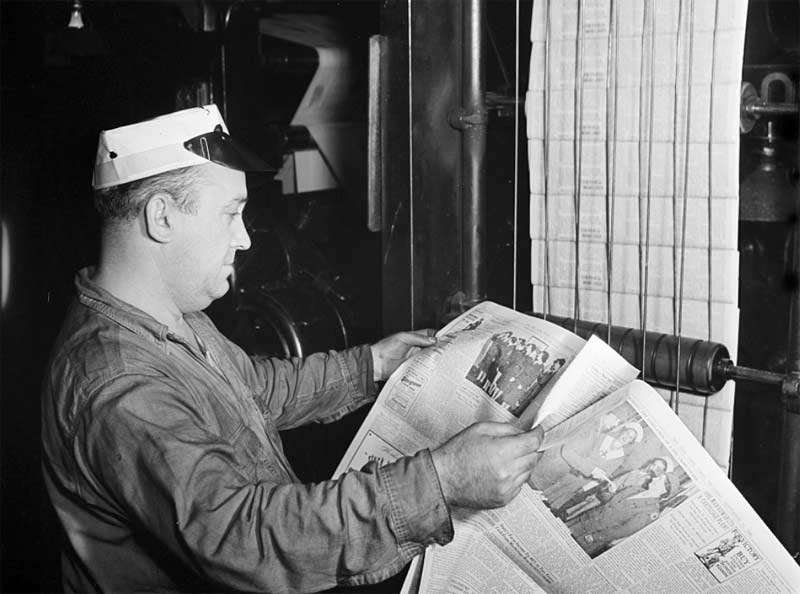
 If you can’t beat the temperance law, separate your city from the rest of New York. “One prominent Democrat has declared in the New York Sun in favor of secession of New York City from the rest of the state and the setting up of the state of Manhattan,” The Granville Sentinel reported on July 26, 1895. “He is provoked to this by the way the Sunday laws are enforced against the sale of liquors.”
If you can’t beat the temperance law, separate your city from the rest of New York. “One prominent Democrat has declared in the New York Sun in favor of secession of New York City from the rest of the state and the setting up of the state of Manhattan,” The Granville Sentinel reported on July 26, 1895. “He is provoked to this by the way the Sunday laws are enforced against the sale of liquors.”
The Sentinel suggested that upstate Republicans would be immediately agreeable with the proposal.
In other lighter side of politics news collected from Northern New York historic newspapers:
This 19th century politician wasn’t listening on his tour of the Adirondacks. He was observing, using multiple senses. “Senator Daniel Brady of Brooklyn, with his family, is spending the summer at The Adirondack Inn,” the Schroon Lake correspondent reported in The Morning Star on August 7, 1895. “He has returned from Long Lake and Newcomb, where he has been for a few days on an observation trip. When he leaves his pleasant quarters in this place, he will go to Port Henry for a few days.”
The Atlanta Exposition proclaimed October 23, 1895 President’s Day. “On that day, Mr. Cleveland will shine on the show,” The Morning Star reported on August 3, 1895.
Former New York Gov. Roswell Flower contributed $500, the equivalent of $18,722 in 2024 dollars, to the debt liquidation fund of Bethesda Episcopal Church at Saratoga Springs, The Morning Star reported on August 7, 1895.
The Bank of England ordered portraits of President Grover Cleveland and Postmaster General William Lynne Wilson to display at the bank in recognition of their advocacy against free silver, The Morning Star reported on August 12, 1895.
“Dr. Niver of Cambridge expressed from Eagle Bridge to President Cleveland at Buzzard’s Bay on the 12th four homing pigeons. The weather being unfavorable, they were held until Wednesday
afternoon,” The Granville Sentinel reported on August 23, 1895.
The pigeons made the 195-mile flight in three hours and forty-five minutes. “The following telegram was received by Dr. Niver Thursday noon: Birds liberated at 8:54. Light wind from the northeast. Grover Cleveland.”
President Rutherford B. Hayes was elected vice president of the American Bible Society, the Elizabethtown Post & Gazette reported on June 10, 1895.
“Two hundred Boy Scouts from Brooklyn saluted President Coolidge today when he left the White House to attend church. After the President had returned the salute, the boys repeated the scout oath of allegiance to the flag,” The Post-Star reported on Jan. 19, 1925.
“Society news from Washington: Coolidge took a trip on the Mayflower without checking any cabinet members aboard,” The Glens Falls Times reported on January 29, 1925.
“The ‘Buckwheat Breakfast’ given us by U.S. Sen. Thos. C. Platt of Owego, November 15, to celebrate the election of Roosevelt and Fairbanks and the Republican state ticket was also made to be occasion to boom Chauncey M. Depew for reelection as United State Senator,” the Mechanicville Saturday Morning Mercury reported on November 26, 1894.
President Calvin Coolidge praised the sport of baseball in a letter responding to John A. Heydler, The Associated Press reported in The Post-Star on February 4, 1925. “Your letter which has just come to my hand telling me of fiftieth anniversary of the National Baseball League has just been read with much interest. Not only because of the nationwide devotion to this splendid game, but because it has been of real moral and physical benefit to the nation.”
It was a sad day for White House trees. “At least a dozen of the splendid elms in the White House grounds at Washington are to be cut down on account of the ravages of the elm-leaf beetle,” The Granville Sentinel reported on September 27, 1895.
“President Grover Cleveland touched a golden button at Buzzard’s Bay at 2 o’clock Wednesday afternoon, and instantly the wheels of the machinery at the Cotton State and International Exposition, 1,000 miles away, leaped into life,” The Granville Sentinel reported on September 27, 1895.
Editorial wit
“The man whose house is on fire will not stop the engines to ask the politics of the firemen.” – The Granville Sentinel, July 5, 1895.
“The newspapers are devoting a good deal of valuable space to the new baby in the White House. The little one is probably just like nine out of ten babies that arrive every day, and, unlike royalty, there is nothing certain in her future to warrant such a howdy do.” – The Morning Star, July 10, 1895.
“Dear Democracy thou hast left us, and thy loss it makes us sigh. O, but Uncle Sam who has bereft us, give us Garfield of Ohio.” – Ticonderoga Sentinel, Nov. 12, 1880.
“A man will sit on an inch edge of a board and talk politics for three hours. Put him in a church pew for forty minutes he gets nervous, twists, turns and goes to sleep.” – The Granville Sentinel, August 9, 1895.
“The people will appreciate the discussion of heavy political questions better if the discussers wait until the summer picnic and travel season is over.” – The Morning Star, August 26, 1895.
“’Do we need politicians?’ asks The Greenwich Journal. ‘Well, no, at least not more than you have now. They seem to be making it lively enough.’” – The Morning Star, September 17, 1895.
Photo: A New York Times pressman checking a newspaper for defects in 1942.



Recent Comments